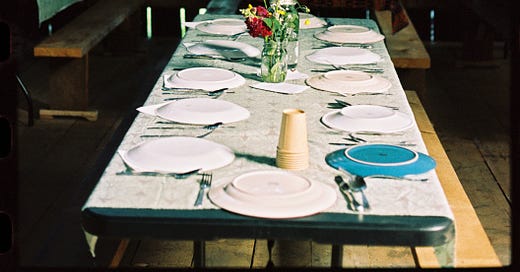Greetings Neighbors and Strangers,
I recently agreed to three interviews in two days. One of them was recorded by
and offered to the public as a half hour radio piece for her show Tidings. That’s the one that I’ve included here, titled Farming and Feeding in the Gift Economy:Hazel edited ninety minutes of conversation down to twenty-nine, which meant a lot of chopping. The first time I listened to it all I could hear was the chopping, but maybe that’s how it goes when you’ve been involved in a real conversation. It was an immense pleasure for me to wrestle with language alongside someone with such finely-tuned attention. Hazel edited out most of her questions, which were invitational, vulnerable, courageous.
I think of real conversations as acts of courtship—yes, between the two humans involved, but perhaps more profoundly those humans might hold themselves in a stance that courts words to leap from the air onto their tongues. If David Abrams1 is right when he asserts that language is a characteristic of landscapes in which humans participate, we might find ourselves surprised by what we hear emerging from our own mouths. That happened at least twice for me in those three interviews. In the conversation with Hazel, I dared to name the root longing that animates the work here: to be able to see our lives as reflections of the persistent generosity that comes in our direction every single day from the surrounding landscape—to become agents of grace. I won’t soon forget that phrase agents of grace.
When grace becomes a verb, it describes the action plan of gratitude, with whom it shares a root.
The next day I spoke with a graduate student in Colorado researching “post-capitalist agriculture.” Partway through our hour on the phone, she said, “I am guessing you’re not going to like this question, but I am going to trust that you will rephrase it as you see fit. What will the Farm look like in five years?” Hazel had asked something similar, so I’d had a warmup. But what I heard come out of my mouth surprised me: “I can’t tell you what the Farm will look like in five years because I have a sense that to do so would be unfaithful.”
I had a sudden feeling that this researcher wasn’t trying to write a paper about faith and spirituality.
“Can you explain what you mean by that?” she asked.
“I’ll try, but it might take me a second to listen,” I replied. Then I heard it. “Imagine if I was going to have a conversation with you, but beforehand I told someone else exactly where I thought we were going to arrive by the end of it. That would seem a bit unfaithful, wouldn’t it?”
As we remember the landscape as a primary conversation partner, we might find it harder and harder to propose five-year plans. That’s simply not the etiquette of a real conversation.
With love,
Adam





Completely bowled over this morning by this Adam. The willingness to live as an “agent of grace.” Yes! Your words inspire me to aspire to this. To abide in the space of unknowing with an open, grateful, and generous heart. Thank you Adam, my heart grew three sizes today ♥️.
Will! That Photo! The decadence on my screen as I scroll slowly down it... Thank you.